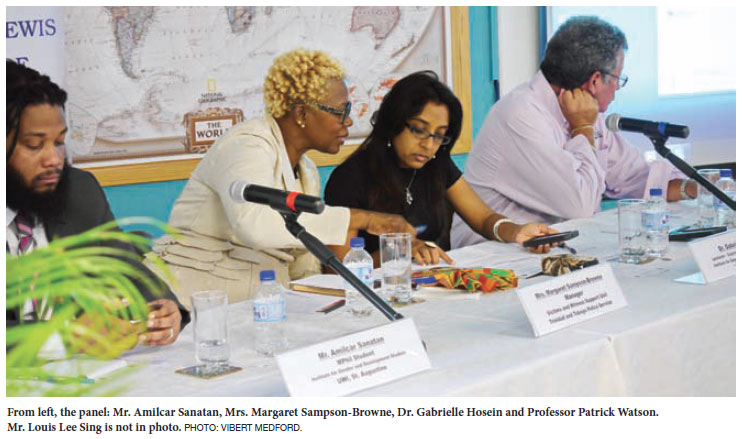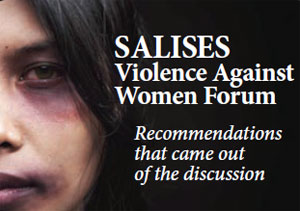|
March 2016

Issue Home >>
|


The Sir Arthur Lewis Institute of Social and Economic Studies (SALISES) hosted a forum on Violence Against Women: A Political Issue?, on February 24 to the standing room only Institute of International Relations lecture room with panelists Dr. Gabrielle Hosein, Lecturer, Institute for Gender and Development Studies (IGDS); Mrs. Margaret Sampson-Browne, Victims and Witness Support Unit; Amilcar Sanatan, IGDS and surprise panelist Mr. Louis Lee Sing, former Mayor of Port of Spain. He was a last minute substitute for Keron Valentine, the current Mayor, who canceled on the morning of the event much to everyone’s disappointment.
Hosein addressed this at the beginning of her presentation, “I could only hope that the mayor’s cancellation this morning is not a sign of the kind of behaviour we can expect from him in terms of keeping to his commitments on this issue of gender-based violence.”
Each person was to give a 20-minute presentation followed by an open Q&A session. Hosein’s presentation was the longest, coming in at over 22 minutes – a remonstration against the notion that gender-based violence is a women’s issue.
“This is not a Government issue or a State issue, it’s a national issue.”
Change in the attitudes of state officials, Hosein stressed must come from a change in their language and recommended the IGDS manual: Guidelines for the use of non-sexist language by Valerie Youssef and Sue Ann Barratt as a resource. She ended with a call to action for government officials.
“It’s not enough to say that the Government will undergo gender education, there must be a deadline for the Mayor’s deliverables and consequences for the Government when they do not follow through,” she said, noting that the Forum was dedicated to eliciting action-based items.
Mrs. Sampson-Browne followed with statistics on domestic violence victims that shocked the audience, “between 2005 to 2015, 300 women were murdered as a result of domestic violence.” [Those figures were later clarified to include men and women.] She also expanded the conversation to include male and female victims of domestic violence, emphasising that victims need advocates like the Victims and Witness Support Unit’s AVA: Addressing Victims Anywhere Project. Changing traditional beliefs was the theme of the forum and came up in Amilcar Sanatan’s presentation which was centered on men’s commitment in the long struggle against gender-based violence and the need to challenge the idea that young people are apathetic.
“Domestic Violence and gender-based violence are men’s issues...and sexist statements will not be tolerated. Since sexist statements are made from sexist seeds of thought on a patriarchal plantation.”
Louis Lee Sing echoed these sentiments in his impromptu presentation answering the forum’s question that “domestic violence is a political issue, it is no longer a social issue.”
The almost two-hour long Q&A session brought out a litany of concerns, questions and personal stories from activists, civilians and victims of gender-based violence alike, who voiced their frustrations with the courts’ treatment of victims; the need for focused lobbying to drive criminal reform and how to fix the culture that creates domestic violence abusers just to name a few. The Forum ended with audience members from organisations aimed at ending gender-based violence identifying themselves such as the Rape Crisis Centre, PSI Caribbean, Madinah House - Shelter for battered women, I am One and others vowing to work together and talk to each other to help continue the discussion and create change on the ground and at all levels.

Jeanette G. Awai is a freelance writer and Marketing and Communications Assistant at The UWI St. Augustine Office of Marketing and Communications.

- Focus not just on Domestic Violence, but also safety in public spaces.
- Training on gender sensitivity should also include training on Non-Sexist Language in Political Life
- Local Government should take responsibility for taking discussion about gender based violence into communities. GBV is a political issue and therefore a matter for government because it is related to the public good and public health of the country
- There should be a particular focus on rural communities, south trinidad and women who work at home as 'housewives' so that these groups also get access to education/perspectives about GBV
- Family violence, including violent forms of discipline, need to be targeted as these socialise children into violent relations
- Use the Sustainable Development Goals to frame lobbying and drive policy reform
- Continue training of state officials who interface the public. Keep in mind that trainings eg of police officers, magistrates and so on is already ongoing by various institutions, including UNWomen and different state machineries
- Court process, especially in terms of Domestic Violence cases, offers a site for specific and achievable reforms, including reforming how victims experience the process, the space of the courts, testifying, delays and so on.
- Educate children in GBV and reproductive health and rights. Population Services International has developed a GBV training manual for children, has been gathering data and is available to support those who want to extend this work.
- Enact sexual harassment legislation and create supportive protocols/focal points and so on with state structures for its effectiveness. Should include public education.
- Create a space for girls to stop them from being housed in the women's prison. This has been budgeted, but never achieved. Advocacy on this front is necessary.
- Each Regional and City Corporation should have its own gender policy. This has been done before in the Penal/Debe Regional Corporation. Allan Sammy and Sabrina Mowlah Baksh can advise.
- Child Line was reported as having an inappropriate response to a caller. Engage them on their effectiveness and what support is needed.
- Reform the process of the Maintenance Courts, particularly around delays and cases being dismissed.
- Liaise with those already working on violence issues e.g. the women of Medina House, PSI.
|





